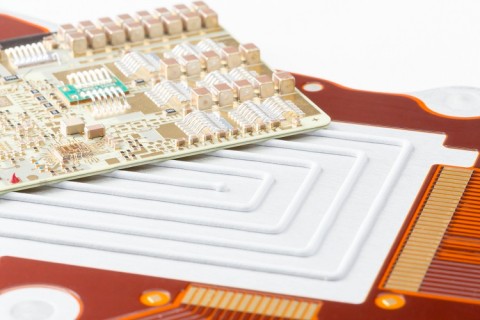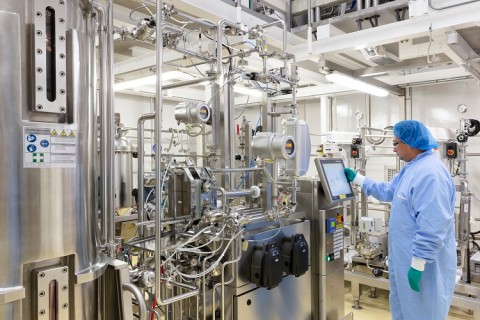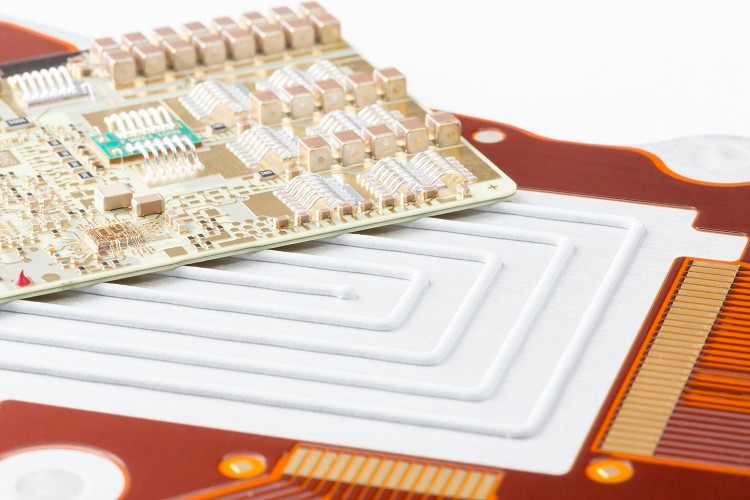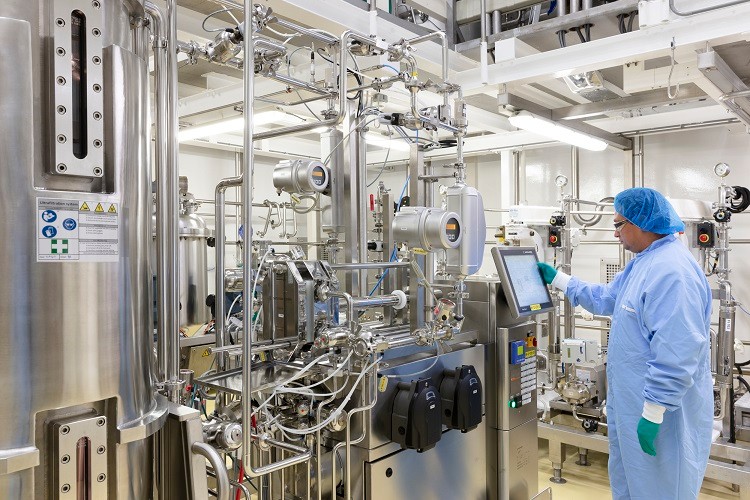EBITDA (earnings before interest, taxes, depreciation and amortization) totaled €930.0 million in 2018 (2017: €1,014.1 million). That was 8 percent less than the year before and corresponded to an EBITDA margin of 18.7 percent (2017: 20.6 percent). The decline was mainly due to business-interruption costs at the Charleston site (USA) and the fact that insurance compensation for the loss event was still pending. Higher raw-material and energy costs also dampened earnings significantly.
The Group’s EBIT (earnings before interest and taxes) amounted to €389.6 million in the past fiscal year (2017: €423.7 million). That was 8 percent lower than a year earlier and corresponded to an EBIT margin of 7.8 percent (2017: 8.6 percent). The fact that depreciation continued to decline benefited EBIT. Depreciation amounted to €540.4 million in 2018 (2017: €590.4 million).
Income from continuing operations climbed 4 percent in 2018 to €260.1 million (2017: €250.1 million). The Group’s net income for the year was also €260.1 million (2017: €884.8 million). In 2017, net income included proceeds of €634.7 million from the deconsolidation of Siltronic as a WACKER segment.
WACKER forecasts continued growth for 2019, despite challenging underlying conditions. It aims to lift its sales by a mid-single-digit percentage. The Group’s EBITDA is likely to decline 10 to 20 percent compared with 2018. This is due to lower average prices for polysilicon, decreasing prices for standard products, and rising energy costs. Net income is projected to be significantly lower than a year ago.
In the first two months of this year, WACKER’s chemical business performed well. The chemical divisions’ total sales for the first two months climbed somewhat versus the same period last year, fueled by volume growth. The two-month sales figure for the polysilicon division was slightly below the prior-year level. While volume growth was strong there, average solar-grade polysilicon prices were lower. For Q1 2019, WACKER expects total Group sales to be at last year’s level (Q1 2018: €1.22 billion). Group EBITDA in Q1 2019 is likely to contract markedly, as lower average prices for the company’s products and significantly higher energy prices are weighing on earnings.
“From today’s perspective, 2019 is not going to be an easy year,” said CEO Rudolf Staudigl in Munich on Tuesday. “For our chemical divi-sions, we are confident that our excellent products will keep us on our growth path. On the other hand, solar-grade polysilicon overcapacities in China are slowing the earnings trend at our polysilicon business – and thus at the Group – despite our leading market and quality position. A particular challenge facing energy-intensive companies like WACKER is the strong increase in electricity prices in Germany. Against this background, we are doing our utmost to cut our costs further. At the same time, we intend to further strengthen our chemical business with targeted investments in line with market growth.”
Investments
In 2018, the Group’s capital expenditures amounted to €460.9 million (2017: €326.8 million). That was 41 percent higher year over year.
Investment activities last year continued to focus on capacity expansion at WACKER’s three chemical divisions. At its US site in Charleston, WACKER continued construction work on a pyrogenic-silica facility. It is scheduled to come on stream in mid-2019. In Ulsan, South Korea, WACKER is currently building new production facilities for dispersions and dispersible polymer powders. In León, Spain, the expansion and modernization of a large-scale fermentation plant was completed. Since the middle of last year, the plant has been producing bioengineered cystine for the food and pharmaceutical industries. In Amsterdam, the Netherlands, WACKER acquired a production site for manufacturing biopharmaceuticals in 2018. This acquisition will enable the chemical group to reinforce its position as a contract manufacturer for pharmaceutical companies. At Holla, Norway, WACKER is expanding its production capacities for silicon metal. The captive production of this key starting material makes WACKER more independent of price fluctuations on raw-material markets and enhances its supply security during times of peak demand.
Employees
The Group’s workforce grew, mainly due to high plant utilization and the integration of the new Amsterdam site. The number of employees rose by around 730 in 2018. As of December 31, 2018, WACKER had 14,542 employees worldwide (Dec. 31, 2017: 13,811). Its German sites had 10,291 employees (2017: 9,984) and its international sites 4,251 (2017: 3,827).
Net Cash Flow, Net Financial Debt and Equity Ratio
In 2018, WACKER again generated cash inflow in the triple-digit millions. As expected, net cash flow of €124.7 million (2017: €358.1 million) was clearly positive but substantially lower than the previous year. The Group’s net financial debt rose year over year. It totaled €609.7 million as of December 31, 2018 (Dec. 31, 2017: €454.4 million). That was 34 percent more than the year before. Thus, net financial debt was in the target corridor WACKER set for debt of between 0.5 and 1 times EBITDA.
WACKER’s total assets on December 31, 2018 amounted to €7.12 billion (Dec. 31, 2017: €6.84 billion). That 4 percent increase chiefly reflected, on the one hand, higher inventories and investments in joint ventures and associates and, on the one hand, higher liabilities and pension provisions. Group equity remained virtually unchanged year over year. On the reporting date, it amounted to €3.15 billion (Dec. 31, 2017: €3.17 billion). The resulting equity ratio was 44.2 percent (Dec. 31, 2017: 46.4 percent).
Business Divisions
WACKER SILICONES generated strong sales growth in 2018. Sales climbed 14 percent to €2.50 billion (2017: €2.20 billion). Gains were supported by markedly higher volumes for specialty products – coupled with a correspondingly better product mix – and higher prices. EBITDA outpaced sales growth year over year. It grew by 39 percent to €616.6 million (2017: €444.9 million), fueled by strong volume growth, higher prices and high plant utilization.
At WACKER POLYMERS , sales rose 3 percent in 2018, reaching €1.28 billion (2017: €1.25 billion). Growth was driven by higher volumes for dispersions and dispersible polymer powders. EBITDA of €147.7 million was 28 percent below the year-earlier level (2017: €205.6 million). A key factor here was the strong increase in raw-material prices.
WACKER BIOSOLUTION S lifted its 2018 sales by 10 percent to €227.0 million (2017: €205.9 million). The increase mainly stemmed from volume growth and better prices for some products. EBITDA of €23.5 million (2017: €37.5 million) was down 37 percent year over year. Factors here included higher raw-material costs and the integration costs for the new sites in León and Amsterdam.
At WACKER POLYSILICON , sales decreased 27 percent in 2018, to €823.5 million (2017: €1.12 billion). The main causes were a marked decline in volumes and the fact that average prices for polysilicon decreased. This market trend was primarily due to China’s decision in late May 2018 to curb feed-in tariffs and cap the amount of new photo-voltaic installations. EBITDA of €72.4 million (2017: €290.4 million) fell 75 percent. Beside lower sales, earnings were dampened by both business-interruption and ramp-up costs at the US site in Charleston.
Proposal on Appropriation of Profits
In 2018, Wacker Chemie AG posted a retained profit of €1,482.3 million under German Commercial Code accounting rules. The Executive and Supervisory Boards will propose a dividend of €2.50 per share at the Annual Shareholders’ Meeting. Based on the number of shares entitled to dividends on December 31, 2018, the total cash dividend corresponds to a payout of €124.2 million. Calculated in relation to WACKER’s average share price in 2018, the dividend yield is 2.1 per-cent.
Outlook
Economists predict that the global economic upturn will continue in 2019, but at a reduced pace.
For its chemical business, WACKER sees good opportunities for further growth this year. Sales at all three chemical divisions are projected to climb further. WACKER SILICONES anticipates a low-single-digit percentage increase. At WACKER POLYMERS and WACKER BIOSOLUTIONS, sales are likely to grow by a mid-single-digit percentage.
WACKER SILICONES expects EBITDA to decline significantly compared to a year earlier amid lower costs for some raw materials. The decline reflects lower prices for standard products. The division forecasts an EBITDA margin of about 20 percent. WACKER POLYMERS anticipates significantly higher EBITDA versus last year, since raw-material costs are likely to be lower and prices for its own products higher. The EBITDA margin is projected at around 14 percent. At WACKER BIOSOLUTIONS, lower integration costs are expected to lift EBITDA to more than €30 million, which is substantially higher than a year ago.
For its polysilicon business, WACKER anticipates a strong increase in 2019 volumes after last year’s contraction. Sales at WACKER POLYSILICON are likely to grow by a low-double-digit percentage. The division expects EBITDA to be balanced and substantially below last year, reflecting markedly lower average prices for solar-grade poly-silicon and the impact of higher energy prices.
Overall, WACKER projects a slight decline in raw-material costs for 2019, but a strong rise in electricity prices in Germany. Given these underlying conditions, total Group sales are expected to increase by a mid-single-digit percentage. EBITDA, on the other hand, will be 10 to 20 percent lower than a year ago. WACKER expects the EBITDA margin to be substantially lower than last year. Capital expenditures of around €400 million will be below last year’s level. Depreciation will come in at around €525 million, also down from last year. For Group net income, WACKER expects a significant decline. Net cash flow is likely to be clearly positive and substantially higher than last year. Net financial debt is expected to be higher than last year. Here, the first-time application of IFRS 16 is having an impact, since it stipulates that lease liabilities are now also to be included in calculations of financial liabilities.
Information for editorial offices: The Annual Report for 2017 is available for download just one click away.












